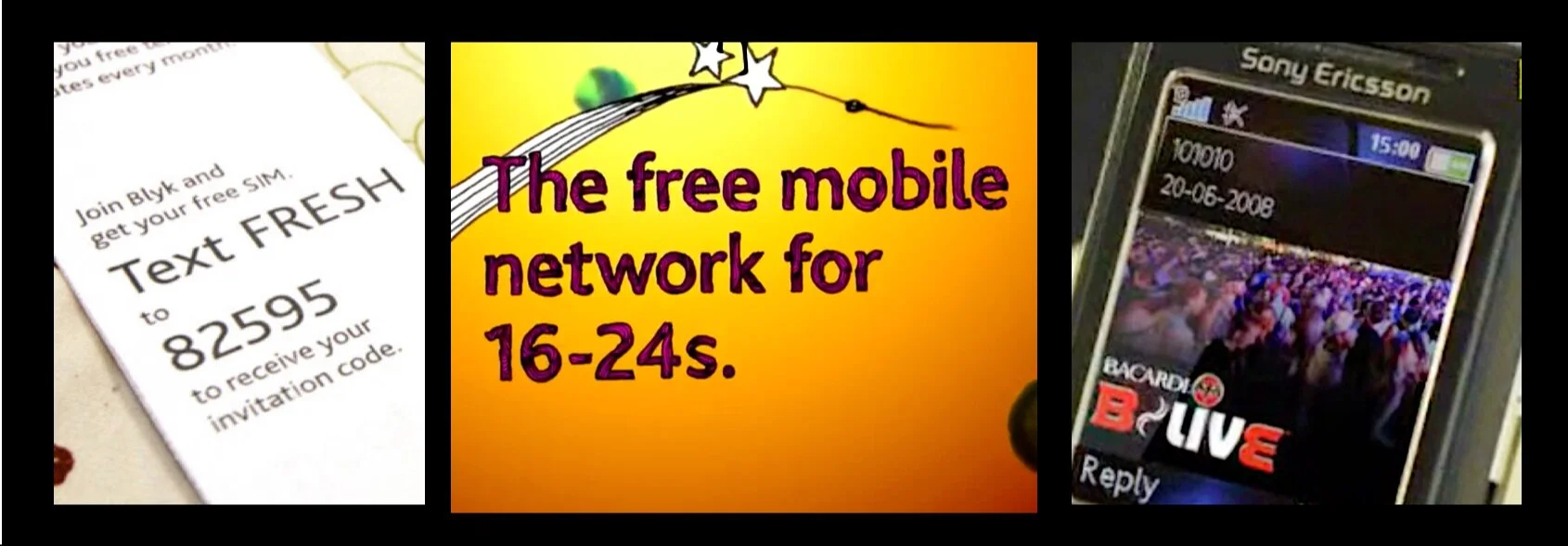Blyk Mobile
MVNO EXCLUSIVELY For Teens
Brief as received
We think mobile phone adoption, mobile services and mobile marketing are being held back by cost.
The monthly cost prohibits the large scale participation of the global youth audiences marketers pay to reach in mass.
We have estimated the operational costs to operate a free mobile phone operator for 16-24 year olds - what does a media model look like to cover these costs?
Whats would it be called?
How does it look as a brand?
Research & Insights
Vox pops / focus groups with teens in SF, London, Helsinki and Singapore.
Global youth wants to do more on their mobile, but it’s too expensive to do more than text.
They never spoke on the phone because of cost and mobile data plans were too expensive to even consider.
Text, Ringtones and physical mods to their handsets were universal. Some markets embraced MMS and picture messaging, while it was too expensive in others.
They didn’t want to be advertised too, but would consider if it “unlocked” their ability to communicate and stay close their friends.
Re-framed brief
What does an empowering mobile only brand look, feel and work like for a global youth 16-24?
Sharpened audience definition
16-18 only. No exceptions.
Problem identified
Global youth lives were revolving around a device they couldn’t afford to use.
Insight that shed new light
Youth liked the idea of being influencers.
Controlling what brands were allowed to connect to to them and even selecting brands they would promote themselves.
Marketplace & cultural understanding
Media “cost per thousands” for teens were the most expensive in marketing. Brands like adidas, Coca-Cola and Disney we all paying top prices to connect and market you youth and young adults.
Mobile youth adoption was quickly rising and text messaging was more than communication for teens, it was culture with its own language.
Mobile “cost-per-units (voice minute, text and data)” varied greatly in Europe, but determined all markets could support the cost of a marketing-supported Virtual Mobile Network Operator [MVNO] underwritten by advertising money.
A new way of thinking about the product or brand
An exclusive brand for teens that connected them to each other and what they loved.
Work the brief inspired
“Blŷk”
the first mobile network exclusively for 16 to 24-year-olds.
Blyk is an “invitation-only” mobile virtual network operator (MVNO) that links young people with brands they like and gives them free texts and minutes every month.
Teens could receive a “Blyk invitation” by texting the word FRESH to 82595, or by a friend inviting you to join the service. The welcome pack contained a SIM card and instructions to set your “member profile” based on key information about yourself, hobbies and habits when it comes to shopping, surfing the web, etc.
The information is used to build an audience profile to ensure you’re targeted with relevant advertising only.
Blyk targeted rich-media MMS and Text ads based on their profile. In return members received a maximum of six messages a week - three of which are commercial and three are content-based (competitions, quizzes, offers).
Results
Launched exclusively to students in the fall, Blyk got off to a strong start in the UK. It gained 100,000 users in its first six months while delivering 25% response rates to advertisers.
Blyk build out a unique audience data set including age, gender, postal code and handset type, while learning more over time based on user’s browsing and call history. Advertisers, including Disney, Coca-Cola and L’Oreal Paris were among the first advertisers.
Blyk grew to the Netherlands and over 250,000 users, but couldn’t outrun the global economic collapse of 2008 and was acquired by French Telecom in 2009.








